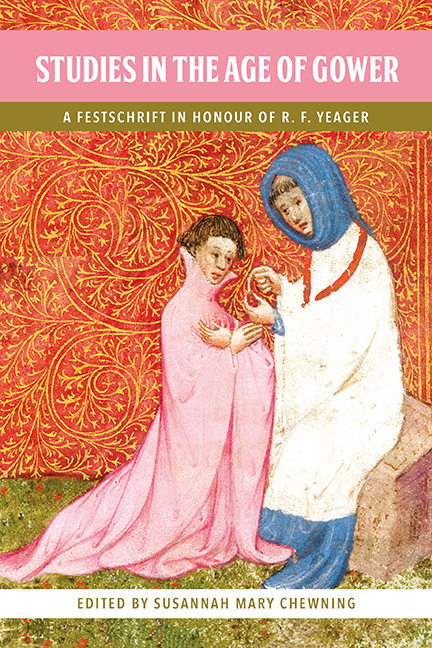Book contents
- Frontmatter
- Contents
- List of Illustrations
- Notes on Contributors
- Acknowledgements
- List of Abbreviations
- Introduction
- Part I Text
- Part II Gender
- Part III Time
- Part IV Spirit
- Part V Intersections
- A Personal Tribute to R.F. Yeager
- Bibliography of R.F. Yeager’s Writings
- General Bibliography
- Index
- Miscellaneous Endmatter
A Personal Tribute to R.F. Yeager
Published online by Cambridge University Press: 28 April 2020
- Frontmatter
- Contents
- List of Illustrations
- Notes on Contributors
- Acknowledgements
- List of Abbreviations
- Introduction
- Part I Text
- Part II Gender
- Part III Time
- Part IV Spirit
- Part V Intersections
- A Personal Tribute to R.F. Yeager
- Bibliography of R.F. Yeager’s Writings
- General Bibliography
- Index
- Miscellaneous Endmatter
Summary
I HOLD A DISTINCTION in this collection, not only as its editor. I was also an undergraduate student of Bob Yeager's. I have known him for as long as I have known the Middle Ages, and in fact most of what I know I learned from him. He also taught me about pedagogy, literary theory, critical thinking, and, of course, writing.
I attended Warren Wilson College, near Asheville, NC, where Bob taught English in an all-male department with faculty who, for various reasons, had all attended or were otherwise connected with Yale. For a mediocre high school student arriving in a rural, tiny college in 1983, these five Yale men were incredibly intimidating. I learned so much from all of them, of course: one was a scholar of Romanticism, which became my secondary field in graduate school; one was a Shakespeare scholar (and an Episcopal priest) who influenced me deeply; one was a very laid-back modern poetry scholar who has, surprisingly, influenced my teaching more than almost anyone. Bob Yeager's influence, however, has continued since my undergraduate years, and this collection is dedicated, among other things, to his greatest gift: his ability to invest in the future of medieval scholarship, and his support of his students over the course of his career.
In his article about Beowulf for his collection (co-edited with Jess Bessinger), Approaches to Teaching Beowulf, part of the MLA Approaches Series, he explains the unique nature of Warren Wilson College and his own approach to teaching:
I try to tie cultural and environmental issues raised by the text to situations familiar to the students in their own lives … there is so much [at Warren Wilson] that illuminates certain passages of the poem. The river twisting through the pasture grows icicles in the winter; its banks hang hoary and dark with roots. By chance, there is a large Indian burial ground on campus under excavation … students work on the site and have helped unearth skeletons, jewelry, and spearpoints. A few black bears live yet in the mountains not far from Swannanoa, and deer and foxes are occasionally observed in the field. The woods at night are very dark and at times can feel quite wild. Since we slaughter our own cattle and pigs, many of the farm-crew students are familiar with floors awash with blood.
- Type
- Chapter
- Information
- Studies in the Age of GowerA Festschrift in Honour of Robert F. Yeager, pp. 227 - 228Publisher: Boydell & BrewerPrint publication year: 2020



